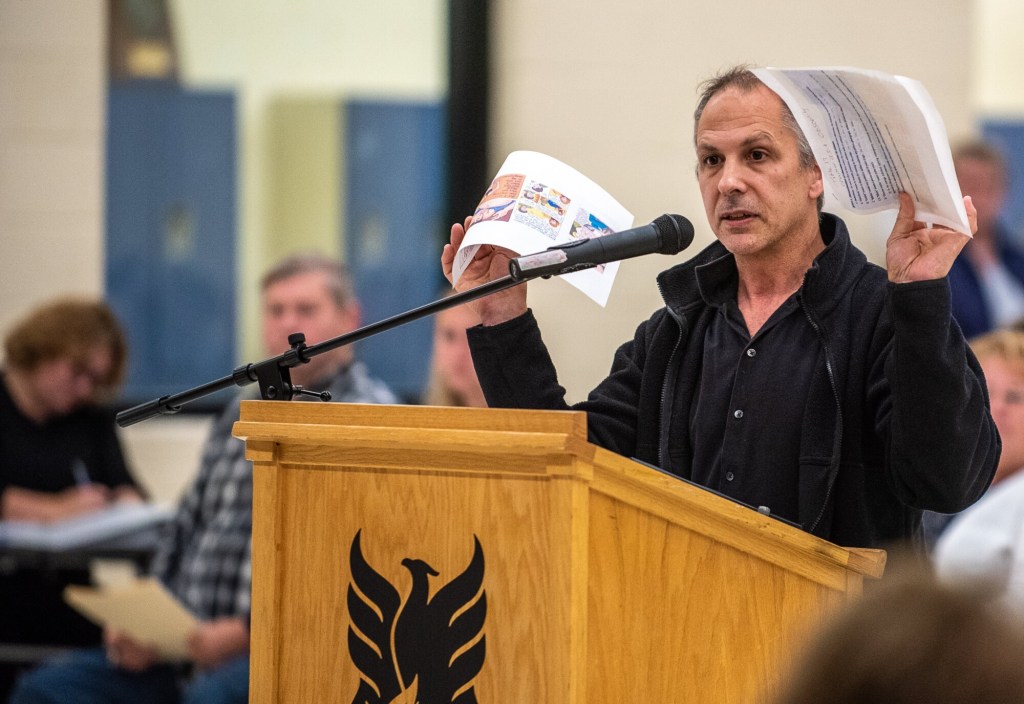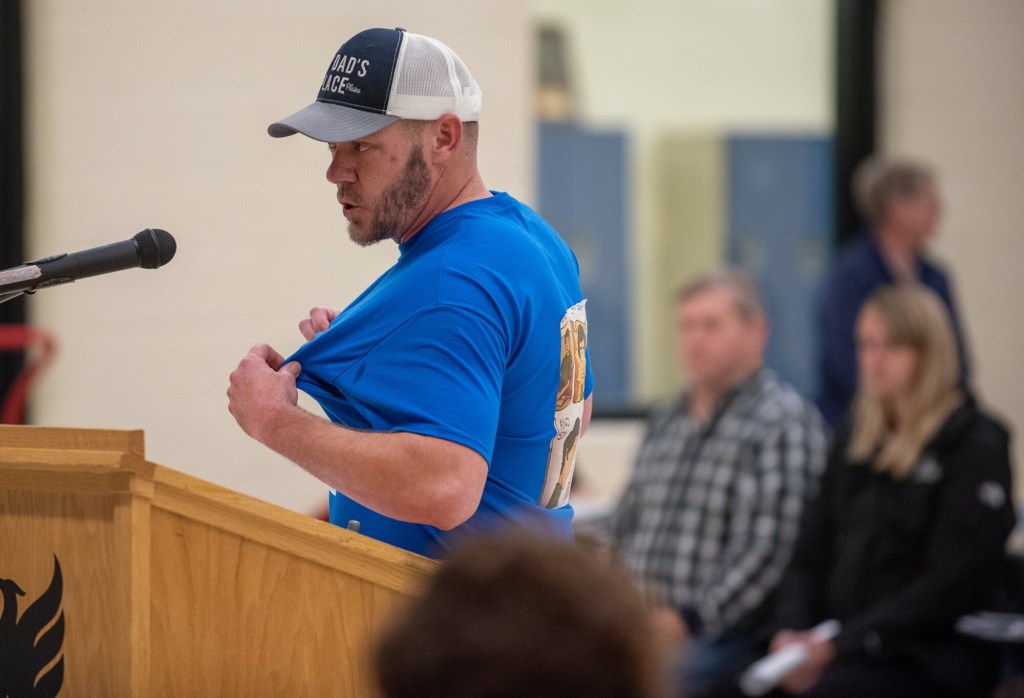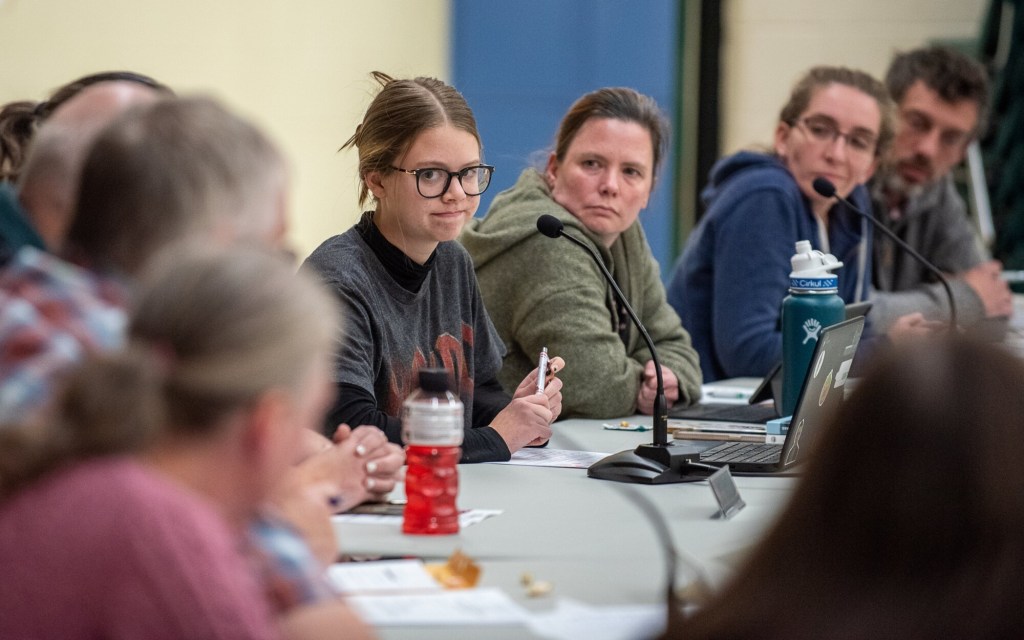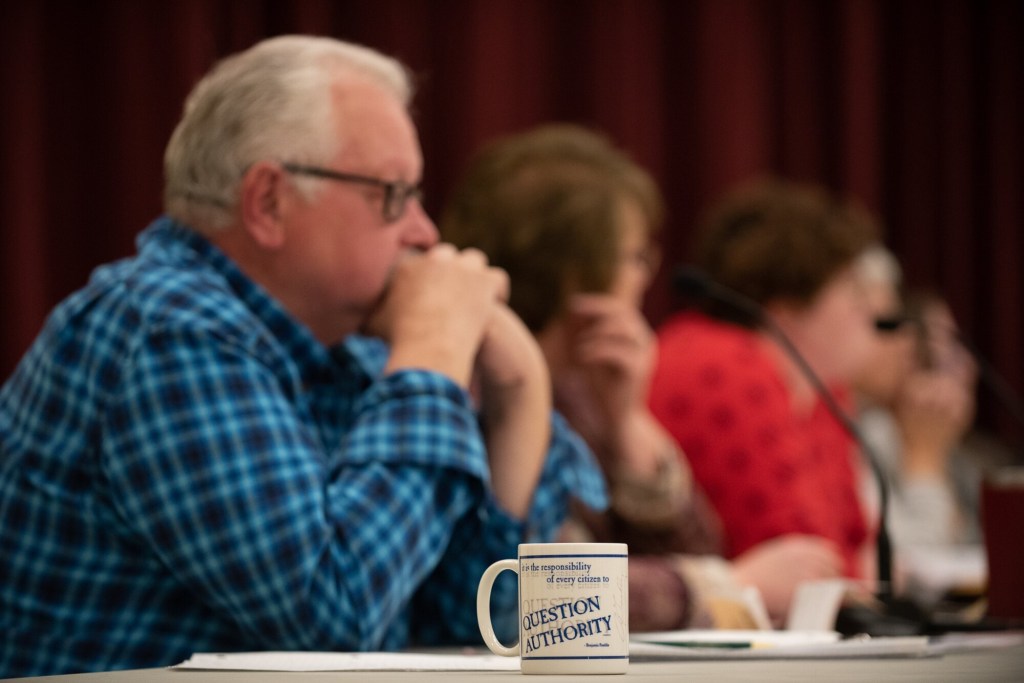JAY — The directors of Regional School Unit 73 heard both sides of an argument Thursday on whether to keep two controversial books on racism and sexuality and gender identity in the Spruce Mountain High School library in Jay before voting to keep them on the shelves.
The board’s decisions followed appeals filed by residents after a review committee recommended the directors allow “Gender Queer: A Memoir” and “White Fragility: Why It’s So Hard for White People to Talk About Racism” to stay.
On Thursday, directors voted 8-4 to allow “Gender Queer” to remain.
Voting to accept were Chantelle Woodcock and Elaine Fitzgerald, both of Jay; Andrew Sylvester and Tasha Perkins, both of Livermore; and Phoebe Pike, D. Robin Beck, Lenia Coates and student representative Ava Coates, all of Livermore Falls.
Opposed were Chairperson Robert Staples and Jodi Cordes, both Jay; Holly Morris of Livermore; and Patrick Milligan of Livermore Falls. Director Joel Pike of Jay was absent.
The vote on “White Fragility” was 11-1. Morris was opposed.
The 2019 publication, “Gender Queer: A Memoir,” written and illustrated by Maia Kobabe, recounts Kobabe’s journey from adolescence to adulthood and the author’s exploration of gender identity and sexuality, according to multiple online sources.
“White Fragility” is an international bestseller written by Robin DeAngelo published in 2018. According to Amazon, she coined the term ‘white fragility’ in 2011 to describe “the ways in which ordinary white people react when it is pointed out to them that they have done or said something that has — unintentionally — caused racial offense or hurt.”
Opposition to the books has been ongoing for the past few months. In September, Superintendent Scott Albert advised directors that formal complaints had been filed, prompting him to follow the district’s policy and appoint a five-member committee to review the books. The appeals were heard Thursday.

John Benedetto of Livermore Falls holds copies of definitions of pornography and some images from a book Thursday night at the Regional School Unit 73 board meeting at Spruce Mountain High School in Jay. The board voted to allow two controversial books on sexuality and gender identity, and racism to remain in the library. Russ Dillingham/Sun Journal
John Benedetto, a parent from Livermore Falls referenced definitions found in state law on dissemination of obscene matter to minors and held up images from the books. “They include things in the Maine statute which are considered illegal in the state of Maine,” he said.
Jeff Bailey, a parent of a high school student and a teacher in a neighboring district, urged directors not to ban the books.
“Our schools are places of learning, growing and belonging,” he said. “At least that is what we have the opportunity to continue to be. The books in question are not being assigned to students, but are simply available to them in our library.
“I would imagine that many books in the library would make someone feel uncomfortable and would challenge our thoughts and beliefs,” he said. “Being able to seek out knowledge and learn how to process information and perspectives other than our own is an important skill. It is, in fact, a major part of producing well-educated and independent graduates in our ever-changing and global world. It is a job skill and a necessity.
“Banning these books would send a clear message — that our schools are NOT for everyone,” Bailey said. “We are for all students of all races and identities. Let’s not ban someone’s story, someone’s experiences, people’s histories. Let’s be an institution of learning, compassion and understanding.”
“I was a teacher for 29 years,” Pam McAllister of Jay said. Her students could have found something objectionable in one of the many books available, she noted. “No one is requiring you read this book.”
August Sender, training coordinator for OUT Maine, said the 2021 Maine Integrated Youth Health Survey found the percentage of Maine teens who identify as LGBTQ+ has continued to increase. “Approximately 27% of Maine’s teens identified their sexual orientation as something other than heterosexual and 6.5% identified as transgender or questioning,” he said.
“Why are we not talking about how less than 22% of lesbian, gay or bisexual students and only 10.3% of transgender students in Maine say they feel safe at school? he asked. “These young people are experiencing unimaginable levels of harassment, bullying and assaults on school grounds.”
Kristy Labonte of Livermore spoke about the value of the perspectives the books provide. “They taught me that the way I grew up is not the way everyone has grown up,” she said. “They have taught me that mental illness, trauma, geography, values all shape who people are and who they become.”
Labonte said three of her six family members are part of the LGBTQ+ community and two of her four children are students of color in the school. “The increase in racial rhetoric around the school, graffiti on the walls, and parents yelling racial slurs at a youth football game have made it clear there is danger here,” she said.
“I am a white mom trying to parent brown sons when I don’t have the experience I need to fully understand their position,” Labonte stressed. She urged the board not to remove the books so those who need them will have access to them.
Physician Steve Bien of Jay said “Gender Queer” is not pornography. If it were then every health and science book would also need to be labeled as such. “If we start banning books based on parents’ concerns where does it end?” he asked. “Banning this book would just be the beginning.”

Ava Coates, student representative on the Regional School Unit 73 board of directors, looks at board members Thursday night after voicing her opposition to banning two controversial books from the high school library. Directors, meeting at the high school in Jay, voted to keep “Gender Queer: A Memoir” and “White Fragility” in the library. Russ Dillingham/Sun Journal
Ava Coates, the student representative on the school board, said most of the school has not read “White Fragility,” which has been in the library for more than four years.
Leslie Geissinger of Jay, who has two sons at the high school, said, “I see a lot of kids in the emergency room who are suicidal. If keeping books is one step we can take, it is on us to take that step to protect these kids.”
Director Beck said in 2003 she and her wife, Patty, were in Indiana and formed a youth group with 52 kids, at least half of whom had been kicked out because their parents wouldn’t see them as LGBTQ+. “What we offered to those kids was a chance to talk, ask questions,” she said.
Shari Ouellette said those appealing the decision to keep “Gender Queer” in the library see the photos as pornography. Parents can opt out of letting their children read the book but what is to prevent someone showing it to other students in a hallway or on the bus, she asked.
She urged the board to follow science. “You are either xx or xy (chromosome), that cannot be changed,” she said.
“While I was reading this book it pulled at my heartstrings knowing we have students who are struggling with their identity,” said Superintendent Albert, who supports the committee’s recommendation. “If having this book can help them, then I am for it. Individual parents have the right to not allow their child to take out this book. If not given this option, I might feel differently.”
He said that before complaints were received about the books, “Gender Queer” had been checked out three times and “White Fragility” never.
On Thursday both books were checked out.
Send questions/comments to the editors.









Comments are no longer available on this story